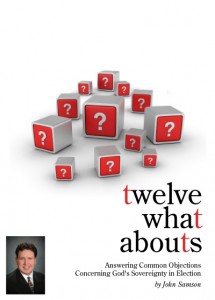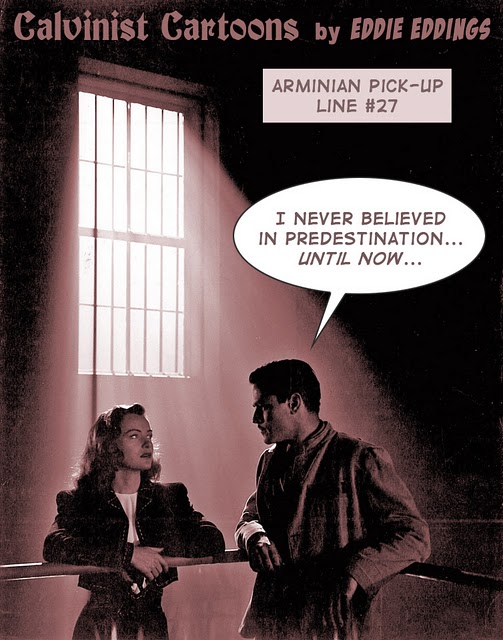 Objection: All Exhortation would be meaningless unless it be within the sinner’s power to obey
Objection: All Exhortation would be meaningless unless it be within the sinner’s power to obey
CHAPTER 5.4: THE INSTITUTES OF CHRISTIAN RELIGION
4. Still it is insisted, that exhortations are vain, warnings superfluous, and rebukes absurd, if the sinner possesses not the power to obey. When similar objections were urged against Augustine, he was obliged to write his book, De Correptione et Gratia, where he has fully disposed of them. The substance of his answer to his opponents is this: “O, man! learn from the precept what you ought to do; learn from correction, that it is your own fault you have not the power; and learn in prayer, whence it is that you may receive the power.” Very similar is the argument of his book, De Spiritu et Litera, in which he shows that God does not measure the precepts of his law by human strength, but, after ordering what is right, freely bestows on his elect the power of fulfilling it. The subject, indeed, does not require a long discussion. For we are not singular in our doctrine, but have Christ and all his apostles with us. Let our opponents, then, consider how they are to come off victorious in a contest which they wage with such antagonists. Christ declares, “without me ye can do nothing,” (John 20: 5.) Does he the less censure and chastise those who, without him, did wickedly? Does he the less exhort every man to be intent on good works? How severely does Paul inveigh against the Corinthians for want of charity, (1 Cor. 3: 3;) and yet at the same time, he prays that charity may be given them by the Lord. In the Epistle to the Romans, he declares that “it is not of him that willeth, nor of him that runneth, but of God that showeth mercy,” (Rom. 9: 16.) Still he ceases not to warn, exhort, and rebuke them. Why then do they not expostulate with God for making sport with men, by demanding of them things which he alone can give, and chastising them for faults committed through want of his grace? Why do they not admonish Paul to spare those who have it not in their power to will or to run, unless the mercy of God, which has forsaken them, precede? As if the doctrine were not founded on the strongest reason – reason which no serious inquirer can fail to perceive. The extent to which doctrine, and exhortation, and rebuke, are in themselves able to change the mind, is indicated by Paul when he says, “Neither is he that planteth any thing, neither he that watereth; but God that giveth the increase,” (1 Cor 3: 7 ) in like manner, we see that Moses delivers the precepts of the Law under a heavy sanction, and that the prophets strongly urge and threaten transgressors though they at the same time confess, that men are wise only when an understanding heart is given them; that it is the proper work of God to circumcise the heart, and to change it from stone into flesh; to write his law on their inward parts; in short, to renew souls so as to give efficacy to doctrine.
5. What purpose, then, is served by exhortations? It is this: As the wicked, with obstinate heart, despise them, they will be a testimony against them when they stand at the judgement-seat of God; nay, they even now strike and lash their consciences. For, however they may petulantly deride, they cannot disapprove them. But what, you will ask, can a miserable mortal do, when softness of heart, which is necessary to obedience, is denied him? I ask, in reply, Why have recourse to evasion, since hardness of heart cannot be imputed to any but the sinner himself? The ungodly, though they would gladly evade the divine admonitions, are forced, whether they will or not, to feel their power. But their chief use is to be seen in the case of believers, in whom the Lord, while he always acts by his Spirit, also omits not the instrumentality of his word, but employs it, and not without effect. Let this, then, be a standing truth, that the whole strength of the godly consists in the grace of God, according to the words of the prophet, “I will give them one heart, and I will put a new spirit within you; and I will take the stony heart out of their flesh, and will give them an heart of flesh, that they may walk in my statutes,” (Ezek. 11: 19, 20.) But it will be asked, why are they now admonished of their duty, and not rather left to the guidance of the Spirit? Why are they urged with exhortations when they cannot hasten any faster than the Spirit impels them? and why are they chastised, if at any time they go astray, seeing that this is caused by the necessary infirmity of the flesh? “O, man! who art thou that replies against God?” If, in order to prepare us for the grace which enables us to obey exhortation, God sees meet to employ exhortation, what is there in such an arrangement for you to carp and scoff at? Had exhortations and reprimands no other profit with the godly than to convince them of sin, they could not be deemed altogether useless. Now, when, by the Spirit of God acting within, they have the effect of inflaming their desire of good, of arousing them from lethargy, of destroying the pleasure and honeyed sweetness of sin, making it hateful and loathsome, who will presume to cavil at them as superfluous? Should any one wish a clearer reply, let him take the following: – God works in his elect in two ways: inwardly, by his Spirit; outwardly, by his Word. By his Spirit illuminating their minds, and training their hearts to the practice of righteousness, he makes them new creatures, while, by his Word, he stimulates them to long and seek for this renovation. In both, he exerts the might of his hand in proportion to the measure in which he dispenses them. The Word, when addressed to the reprobate, though not effectual for their amendment, has another use. It urges their consciences now, and will render them more inexcusable on the day of judgement. Thus, our Saviour, while declaring that none can come to him but those whom the Father draws, and that the elect come after they have heard and learned of the Father, (John 6: 44, 45,) does not lay aside the office of teacher, but carefully invites those who must be taught inwardly by the Spirit before they can make any profit. The reprobate, again, are admonished by Paul, that the doctrine is not in vain; because, while it is in them a savour of death unto death, it is still a sweet savour unto God, (2 Cor. 2: 16.)
Continue reading →
 As my new book is now published and being read, it has been very gratifying to receive feedback from people telling me how helpful the material has been. Obviously an author writes for the purpose of being read and my prayer is that if God so wills, the book will be a useful tool in the Master’s hands to allow many of His precious saints to gain more of an understanding of the depth, riches and power of God’s measureless grace in Christ.
As my new book is now published and being read, it has been very gratifying to receive feedback from people telling me how helpful the material has been. Obviously an author writes for the purpose of being read and my prayer is that if God so wills, the book will be a useful tool in the Master’s hands to allow many of His precious saints to gain more of an understanding of the depth, riches and power of God’s measureless grace in Christ.
 Objection: All Exhortation would be meaningless unless it be within the sinner’s power to obey
Objection: All Exhortation would be meaningless unless it be within the sinner’s power to obey  “Now the other myth that gets around is the idea that legislation cannot really solve the problem and that it has no great role to play in this period of social change because you’ve got to change the heart and you can’t change the heart through legislation. You can’t legislate morals. The job must be done through education and religion. Well, there’s half-truth involved here. Certainly, if the problem is to be solved then in the final sense, hearts must be changed. Religion and education must play a great role in changing the heart. But we must go on to say that while it may be true that morality cannot be legislated, behavior can be regulated. It may be true that the law cannot change the heart but it can restrain the heartless. It may be true that the law cannot make a man love me but it can keep him from lynching me and I think that is pretty important, also. So there is a need for executive orders. There is a need for judicial decrees. There is a need for civil rights legislation on the local scale within states and on the national scale from the federal government.” — Martin Luther King Jr., from an address at Western Michigan University, December 18, 1963.
“Now the other myth that gets around is the idea that legislation cannot really solve the problem and that it has no great role to play in this period of social change because you’ve got to change the heart and you can’t change the heart through legislation. You can’t legislate morals. The job must be done through education and religion. Well, there’s half-truth involved here. Certainly, if the problem is to be solved then in the final sense, hearts must be changed. Religion and education must play a great role in changing the heart. But we must go on to say that while it may be true that morality cannot be legislated, behavior can be regulated. It may be true that the law cannot change the heart but it can restrain the heartless. It may be true that the law cannot make a man love me but it can keep him from lynching me and I think that is pretty important, also. So there is a need for executive orders. There is a need for judicial decrees. There is a need for civil rights legislation on the local scale within states and on the national scale from the federal government.” — Martin Luther King Jr., from an address at Western Michigan University, December 18, 1963. According to Psalm 1, the blessed man is someone who delights in the word of God and meditates on it day and night. That is all well and good, “John, this is true about you.” Somehow when I do this, I find that the truth of what Scripture says seems to impact my heart in fresh ways. I often gain new insights into the Biblical text by following this simple method.
According to Psalm 1, the blessed man is someone who delights in the word of God and meditates on it day and night. That is all well and good, “John, this is true about you.” Somehow when I do this, I find that the truth of what Scripture says seems to impact my heart in fresh ways. I often gain new insights into the Biblical text by following this simple method. Justin Taylor writes:
Justin Taylor writes: For more than two centuries, George Whitefield has been considered the most brilliant and popular preacher the modern world has ever known. He began preaching at an early age of twenty-two and his voice startled England like a trumpet blast. He boldly preached the fundamental doctrines of the Christian faith and was attacked by clergy, the press, and even mobs. Most of His preaching was in the open air to crowds of twenty to thirty thousand people. Yet for all his popularity and impact he remained a man of humility and deep spirituality. He died at the age of 55 and had preached an estimated 30,000 sermons. His penetrating comments are as wise and relevant today, as they were when he first preached them. His sermons have been consistently recognized, and their usefulness and impact have continued to the present day, even in the outdated English of the author’s own day.
For more than two centuries, George Whitefield has been considered the most brilliant and popular preacher the modern world has ever known. He began preaching at an early age of twenty-two and his voice startled England like a trumpet blast. He boldly preached the fundamental doctrines of the Christian faith and was attacked by clergy, the press, and even mobs. Most of His preaching was in the open air to crowds of twenty to thirty thousand people. Yet for all his popularity and impact he remained a man of humility and deep spirituality. He died at the age of 55 and had preached an estimated 30,000 sermons. His penetrating comments are as wise and relevant today, as they were when he first preached them. His sermons have been consistently recognized, and their usefulness and impact have continued to the present day, even in the outdated English of the author’s own day.


 This is a wonderful day of joy and affirmation for some, and yet can be a very lonely day for others… Its a day the single person could squander by thinking of what he/she does not have, pining for the clock to strike midnight to indicate that Valentine’s Day has come and gone. It can be a brutal emotional day. But it does not have to be. Not be a long shot! Instead, it can be a day to be thankful for all one does have, and to once again affirm that God is our refuge and strength. It is a day to trust the hand of Providence, even as the heart longs for His intervention.
This is a wonderful day of joy and affirmation for some, and yet can be a very lonely day for others… Its a day the single person could squander by thinking of what he/she does not have, pining for the clock to strike midnight to indicate that Valentine’s Day has come and gone. It can be a brutal emotional day. But it does not have to be. Not be a long shot! Instead, it can be a day to be thankful for all one does have, and to once again affirm that God is our refuge and strength. It is a day to trust the hand of Providence, even as the heart longs for His intervention. Valentine’s Day, like any other day certainly is not the time to settle for something less than God’s best. His sheep will find no spiritual companionship with goats. “Be not unequally yoked with an unbeliever” the Scripture says. It is better to wait for the sheep of His choice than to settle for the affection of a goat, just because NOT to do so would mean loneliness on Valentine’s Day. May Christ be our all in all.
Valentine’s Day, like any other day certainly is not the time to settle for something less than God’s best. His sheep will find no spiritual companionship with goats. “Be not unequally yoked with an unbeliever” the Scripture says. It is better to wait for the sheep of His choice than to settle for the affection of a goat, just because NOT to do so would mean loneliness on Valentine’s Day. May Christ be our all in all.